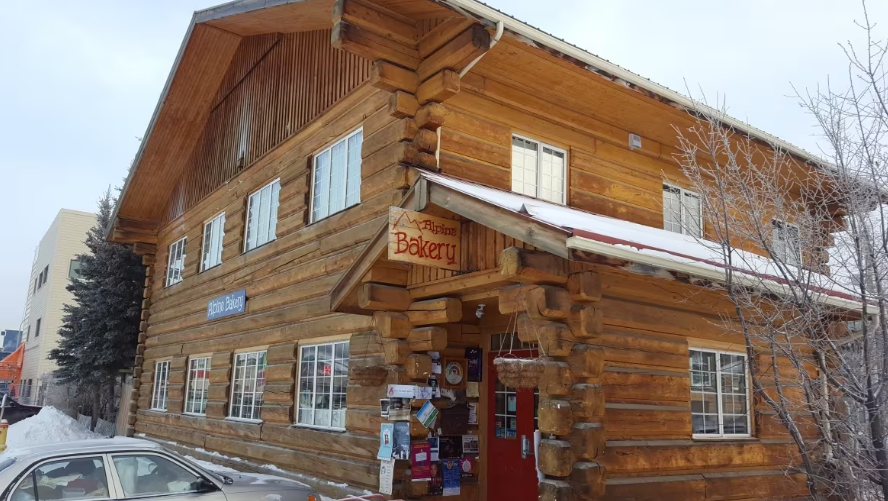Downtown business owners hope report recommendations ease tensions around Whitehorse shelter

“Beautification,” community liaisons, organized activities and decentralization.
Those are some of the solutions a new report offers to ease tensions between emergency shelter clients and neighbouring businesses in downtown Whitehorse — and some of the local business owners say they’re hopeful for a solution.
“To try to keep the places clean, I think that would make a big difference,” said Ben Eisele who manages All-West Glass across the street from the shelter.
“What a lot of people are hoping for is that there’s less noise and debris outside, and people can feel safe to walk around.”
The Whitehorse Emergency Shelter houses 20 permanent residents and an average of 37 people who need temporary beds each night.
Located on Alexander Street, next to shops and residential buildings, it’s been a consistent source for complaints about noise, litter, substance use and other public disturbances since it first opened in 2017.
“For the last, about two years, it’s been quite painful,” Eisele told CBC News. “We have constant debris, we have clients solicited for money, we have drunk people coming into our business that we have to remove, sometimes with police … It’s been a horrible experience.”
Other businesses have had similar experiences.
Duffy’s Pets is right next door to the shelter. Owner Hans Otelli said clients outside the building disturb his business.
“For us, it’s been really rough, because we had so many people commenting that they don’t want to come here anymore with their kids,” he said in an interview.
Report suggests ways to improve relations, safety
A new independent review of the shelter, released last Thursday, is suggesting ways to improve neighbourhood relations.
The Path Forward report was produced by House of Wolf and Associates, Inc., and commissioned by the Council of Yukon First Nations (CYFN) on behalf of the Yukon government. CYFN manages the shelter and not-for-profit Connective, formerly known as the John Howard Society, runs daily operations.
House of Wolf interviewed front-line staff, neighbours and dozens of clients. Its report found that safety, substance use and a lack of supports were all concerns.
It acknowledges a history of public disturbances outside the shelter, from fighting to drug use, and says neighbours interviewed for the report repeatedly said they’d been made uncomfortable or felt unsafe living and working near the shelter.
Between July 2021 and March 2022, the shelter consistently represented at least one tenth of calls to the RCMP in downtown Whitehorse. “Causing a disturbance,” according to the report, represented more than 40 per cent of calls to the police.
One front-line shelter worker, quoted anonymously in the report, said they frequently felt they had no control of the situation.
“I don’t put this on any person but this place has very little oversight and I feel we are tremendously under-supported.”
The report released last week advises bringing in community liaisons to help supervise the street and act as a bridge between police, the shelter and its neighbours.
Recommendations veer away from increased security and bylaw enforcement, and toward community planning and increased resources.
The report says communication must be improved between the shelter and its neighbours. It also said more spaces needed to be provided for clients who wished to be in a sober environment — the report said the shelter had become seen, however truthfully, as a meeting place for substance users — and for women seeking safe gendered spaces.
These spaces, says the report, would help reduce crowds outside the shelter.
The report also recommends offering more organized activities, and cultural supports for the majority-Indigenous clientele, to keep clients occupied, engaged and away from substances.
Spreading activities and supports throughout the city, the report says, would also limit disruptive gatherings.
Another option considers reducing crime through “environmental design.”
The idea is that, through better planning and design — better lighting, more garbage cans, regular cleanups and so on — “pride in the community is fostered, citizens and visitors are safer, while the environment is also perceived as such.”

Like Eisele, Walter Streit is optimistic about what could come from the new report. Streit owns Alpine Bakery just down the road from the shelter. He also lives in an apartment above the shop.
“It is positive,” he told CBC. “They have to decentralize the amount of people. That’s in several points there in that report.”
But Streit says he his business could be hurt badly if things don’t change quickly.
“I was, today in the morning, collecting garbage for one hour again around our property,” he said.
“The tourist season is coming. And we need tourists this year because of pandemic problems…but how it looks around the shelter is definitely keeping people away.”
A report written by Ethan Lang
Related stories from around the North:
Canada: International Women’s Day time to recognize contributions at the community level, says Pauktuutit, Eye on the Arctic
Finland: Swedish-speaking Finnish women launch their own #metoo campaign, Yle News
United States: Craft space aims to teach Alaska Indigenous women skills — and help beat addiction, Alaska Public Media



